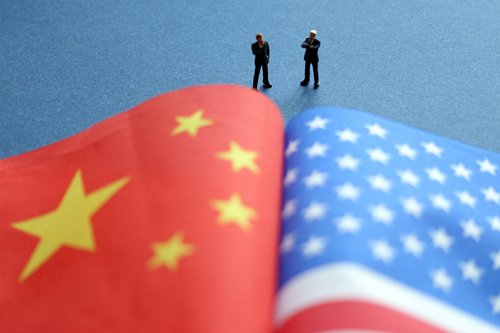HOME >> OPINION
US national security apparatus shows a grim face
By Zhu Feng Source:Global Times Published: 2019/5/26 19:28:39
US national security organs show a grim face

Photo: VCG
The 40 years since the establishment of China-US diplomatic relations have witnessed how economic and trade relations between the two countries have been improving, and how the two economies have been growing together and benefiting from each other. The vast majority of Chinese born in and after the 1970s had a complex impression of the US, but had not seen the grim face of the US national security apparatus launching a full-fledged attack against another country.
The US government's current suppression on China is becoming more and more intense. China's powerful rise has triggered the US national security apparatus.
Since the end of the Cold War, the US economy has rapidly shifted to "financial capitalism," and has relocated a large part of its manufacturing abroad, with financial services and the service industry accounting for 80 percent of its GDP. It is precisely in these 30 years that China has become the most successful and the fastest growing country in industrialization.
The hundreds of billions of dollars in the US trade deficit with China frequently cited by the US government is not the result of the forced transaction of goods from China to the US, but the result of global industrial division of labor and coordination, the outsourcing of the US manufacturing industry and America's excessive dependence on financial services and the service industry.
Meanwhile, a large number of cheap and fine products made in China have entered the American market, which helps the US stabilize prices and improve the lives of lower- and middle-class Americans.
With the substantial development of its import and export capacity, China has grown into the largest USD currency owner overseas with a large dollar exchange surplus, nearly half of which is invested in US Treasuries. This helps the US stabilize the exchange rate and at the same time makes sure that China's economic growth is involved in the dollar-dominated international financial system.
The benefit of economic cooperation between China and the US is remarkable. Former US president Barack Obama once publicly said that the US welcomes a "strong, prosperous and stable China." In just two years since Donald Trump took office, his administration has not only abandoned the basic principles of its predecessor's policy toward China, but even launched an unprecedented trade war, with markets and consumers in both countries suffering the costs.
This shows that with increasing security concerns over China, the US will definitely prioritize security over economy.
In contemporary international relations, the US domestic power structure makes it a very typical super "national security state."
Some US colleges and universities have taken measures to stop or restrict scientific and technological research and development cooperation with Chinese companies, and are even beginning to take action concerning admissions and interaction with researchers. It is under pressure from the US government. On the other hand, the "patriotic consciousness" of American society usually inflates following the US government's policy against "threats" and "enemies."
Some American elites overwhelmingly support Trump's hardline policy toward China, which reflects the fact that the US, as a "national security state," always stands in line with its people on issues related to the interests of American hegemony. We should come to realize that in this contest between China and the US, these American elites form part of the "American power."
The evolution of Sino-US relations in the past two years has enlightened us on a comprehensive and in-depth understanding of the US. In spite of political opposition and social division, American government and people cooperate well with each other when fighting against China as their adversary.
China still lags behind the US in terms of comprehensive strength and the ability to mobilize the international community. Confronting the current situation, China should adhere to strategic sobriety and determination and make good use of its strength.
Most importantly, China should seize strategic opportunities, comprehensively deepen reform and opening-up, unswervingly and continuously integrate into the world, and constantly improve the nation's governance capacity.
The author is director of the Institute of International Relations at Nanjing University. opinion@globaltimes.com.cn
Newspaper headline: US national security organs show a grim face
Posted in: VIEWPOINT